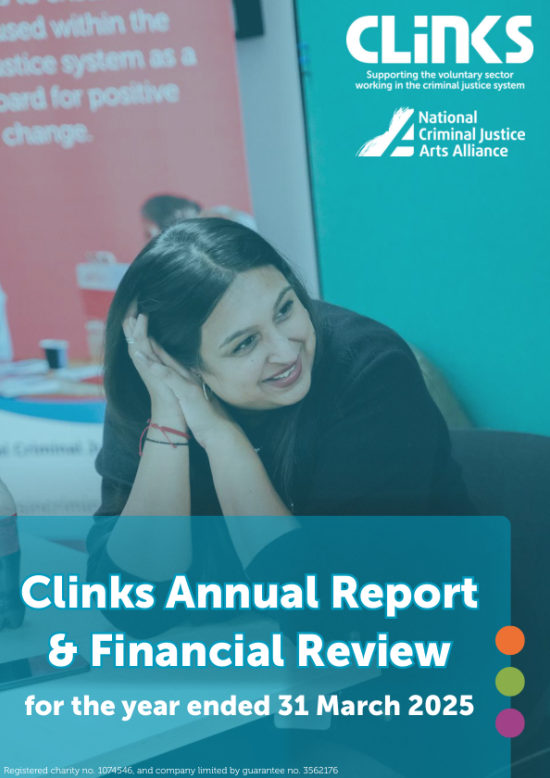In this blog, Clinks’ Health and Justice Policy and Development Officer, Zahra Wynne, explores the health inequalities that people in contact with the criminal justice system face. She outlines how Clinks will be working with, and on behalf of, our members this year to support health and justice initiatives.
My role is to lead Clinks’ work on health and justice and service user involvement through the Voluntary, Community and Social Enterprise (VCSE) Health and Wellbeing Alliance – a partnership between the voluntary sector and the health and care system which aims to provide a voice and improve health and wellbeing for communities who experience health inequalities. Clinks and Nacro work in partnership as members of the Alliance to represent organisations that work with people in contact with the criminal justice system.
Our focus this year
This year, I’ll be leading Clinks’ work to support, promote and represent the voluntary sector’s work to improve the health of people in contact with the criminal justice system and ensure the sector is involved and engaged in the development of health and justice policy and interventions. The voluntary sector is more important than ever in the effort to reduce health inequalities for people in the criminal justice system. Our state of the sector research shows that 69% of organisations working in the criminal justice system support people with mental health needs, 66% support people with substance misuse issues, 53% support older people, and 38% support people with physical disabilities.
Through our work with the Health and Wellbeing Alliance, Clinks will be monitoring and engaging with health and justice initiatives, many of them featured in the NHS Long-Term Plan. We welcome the direction of travel of the NHS Long-Term Plan in addressing health inequalities and its inclusion of health and justice initiatives – and through our work we will seek to ensure that they are properly implemented.
These include:
- The Community Sentence Treatment Requirements (CSTR) programme: community sentences where the person has to attend and complete treatment for a mental health, substance misuse and/or alcohol misuse issue, as an alternative to prison.
- The RECONNECT: Care after Custody programme: a care after custody initiative, providing support by sign-posting people with multiple and complex needs to relevant services after release from prison.
- The National Partnership Agreement for Prison Healthcare in England: a partnership agreement between the Ministry of Justice, Her Majesty’s Prison and Probation Service, Public Health England, the Department of Health & Social Care, and NHS England. Clinks will work to ensure that knowledge and expertise of the voluntary sector are considered and the sector is able to contribute to it where possible.
Additionally, we’ll be paying close attention to the health and social care needs of older people in the criminal justice system, as well as pregnant women and recent mothers serving community sentences.
Shining a spotlight on health inequalities
Within health policy there is a focus on ‘health inequalities’, with a recognition across the government and the voluntary sector that people living in the most deprived areas of the country experience worse health access and outcomes, and committed action within the NHS Long Term Plan and adjoining documents to address this through targeted funding.
However, some of the worst health inequalities people experience are not area-based. National health policy tends to have a far sparser focus on inclusion health groups – which can be described as groups of people at risk of or living with extremely poor health as a result of poverty, marginalisation, living with multiple health conditions, and social exclusion. Definitions of these groups vary – but Clinks as a member of the Health and Wellbeing Alliance and its inclusion health sub-group define these groups as:
- People in contact with the criminal justice system
- Gypsy, Roma and Traveller communities
- People with learning disabilities;
- Refugees and migrant communities
- People experiencing homelessness
- People engaged in sex work.
People in contact with the criminal justice system face many disparities in health. Here’s a snapshot:
- People supervised by probation services in the community are over ten times more likely than those in the general population to die by suicide
- According to Her Majesty’s Chief Inspector of Prisons for England and Wales annual report for 2018-19, just under a third of men (32%) and less than a quarter of women (22%) said it was easy to see a doctor in prison
- 36% of people in prison are estimated to have a physical or mental disability, compared with 19% of the general population.
These statistics are concerning, but unfortunately unsurprising. The Marmot Review Ten Years On (the ten year follow-up to the landmark report on health inequalities in England, The Marmot Review) finds that involvement in the criminal justice system has a direct effect on health – particularly mental health and stress. We know that people in contact with the criminal justice system often have pre-existing issues relating to substance misuse, mental ill health, experiences of homelessness and childhood traumas, which is often linked to their offending. Considering this alongside the further impacts on health which involvement in the criminal justice system results in, this presents a clear need to focus on interventions that work to address and meet people’s health needs, rather than solely their rehabilitation needs. Better health outcomes can help lead people away from contact with the criminal justice system.
Where next?
Moving into the next decade, the NHS Long-Term Plan has introduced exciting upcoming opportunities to improve health outcomes for people involved in the criminal justice system, and break the vicious cycle of disadvantage, offending, and prison – and all of these opportunities involve the voluntary sector.
I am looking forward to working with Clinks’ members and advocating for the role of the voluntary sector in ensuring that people in contact with the criminal justice system have fair access to healthcare, positive and dignified experiences of healthcare, and health outcomes on par with that of the general population.
For more information about Zahra and her role, Clinks’ work on health and justice or to talk to us about work that you are doing in this area, click here
What's new
Blogs
Anne Fox CEO of Clinks to stand down after a decade of service
Latest on X
The role is for a leader from an organisation focused on racially minoritised people, with expertise in service delivery, policy, advocacy, or related areas in criminal justice. Racial disparities are present at every CJS stage. This role ensures these voices are central in shaping policy to help address and eradicate them. Apply by Mon 18 Nov, 10am. More info: https://www.clinks.org/voluntary-community-sector/vacancies/15566 #CriminalJustice #RR3 #RacialEquity

